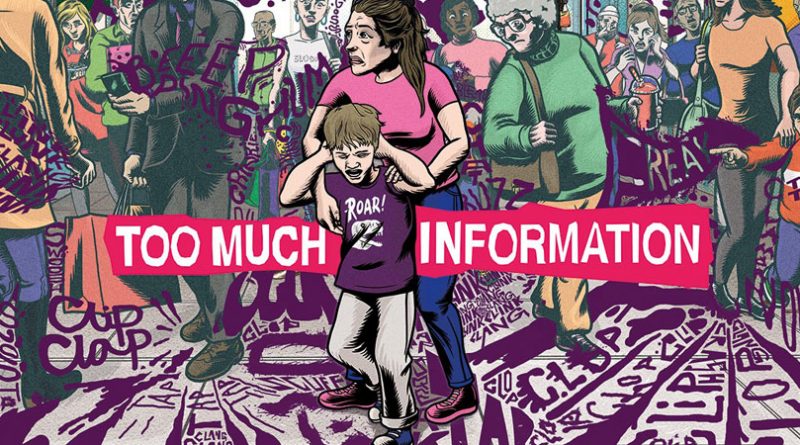Autistic burnout
For Autism Awareness Week a colleague wrote the following blog on an internal system. It’s a powerful blog so I was pleased to get his permission to reproduce it here.
Introduction
Autistic Burnout is, I believe, a fairly common problem that is not openly addressed very often. It’s quite painful to talk about so please do bear with me, but as it is World Autism Awareness Week it feels like the right time to put some emphasis on “awareness”, with all
of the gory details included.
Warning: some of the images below are intended to illustrate sensory overload for those who don’t experience it, but they could be triggering for those with photosensitivity.
Some background on Autism
The autistic spectrum covers a range of conditions classified as pervasive neurodevelopmental conditions (I tend to prefer “condition” over “disorder”) which are differences in the growth and development of the brain or central nervous system characterised by, among other things, social and communication difficulties, stereotyped or repetitive behaviours & interests and sensory issues. The autistic spectrum is an umbrella term covering a range from individuals who might have severe difficulties (who would previously have been described as having “autistic disorder” or classical or Kanner-type autism) who may need lifelong care, through to those who would have been described as having Asperger Syndrome. These days there is an increasing trend to simply refer to Autistic Spectrum Conditions (or “Disorders”) though in the UK Aspergers is still used a lot.
As an aside, the reason I prefer “Condition” over “Disorder” is that the latter has more negative connotations and ASC per se is not a disease (you can’t catch it) nor a mental health disorder (though some comorbidities of ASC are) it is simply a pervasive (present
from birth) neurodevelopmental difference – a neurodivergence if you will.
As another aside different ends of the autistic spectrum are often referred to as “low-functioning” and “high-functioning”, I don’t really like functioning labels as a) who gets to choose the label? usually not the person themselves and b) “it’s complicated” for reasons I’ll try to cover later.
Triad of Impairments
Autistic Spectrum Conditions are categorised by the so-called “Triad of Impairments”.
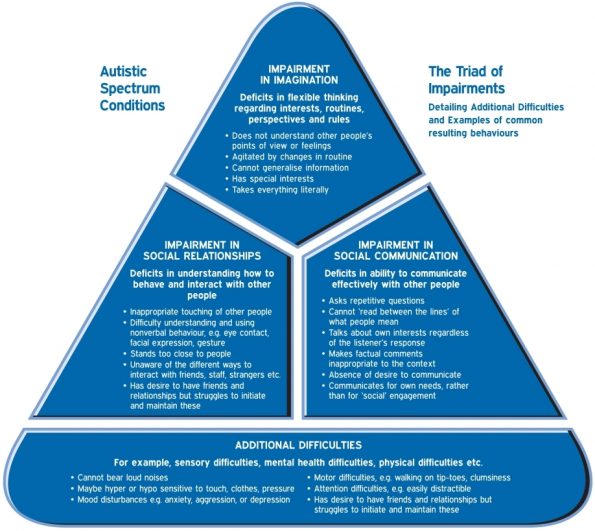
In all honesty though it’s an awful lot more nuanced than that and it’s worth bearing in mind that as well as individuals being in different places on the autistic spectrum individual difficulties form a spectrum within an individual, for example, I don’t have too much difficulty “generalising information” and indeed I have often been involved in what might be considered “strategic” things, on the other hand, I’m really super-agitated by changes in routine, special interests – oooohhh yes! “Takes everything literally” is interesting, because I’ve never taken anything in my life (I’m only half joking, I did mentally add the comma) that’s something of a natural tendency and I did it a lot as a child, but OTOH I’m pushing 50 now so I think I’m fairly conditioned to idioms and other figures of speech, so I mostly just have a bit of a processing delay these days.
I do like puns though, as I tend to see the punchline as a funny picture in my head before the hook really registers. As I say everyone is different – so what the heck is “normal” anyway?
But this post isn’t about the Triad of Impairments other than to say that one of the interesting things about the Triad of Impairments is that it’s often used to judge the level of disability of autistics but contains a huge irony in the statement “Does not understand other people’s points of view or feelings”, yes it really says that, but then describes (as deficits) a bunch of traits purely from a neurotypical frame of reference, I mean “eye contact” who exactly decided that staring at someone’s eyeballs was “normal”? These things being perceived as deficits from a neurotypical frame of reference does, however, play into Autistic Burnout as I shall explain later.
So the Triad of Impairments might form part of the challenges of an autistic, though from our frame of reference it’ s everyone else who is “weird”, but for many of us those subjective deficits aren’t actually what often give us the biggest challenges, rather it’s the bit casually lumped under “Additional Difficulties” where the real challenges can present themselves, that’s certainly the case for me.
Passing
I’m 50 next month and when I was a child autism wasn’t really talked about, or if it was it was in reference to kids who had fairly profound challenges and it was always in highly negative terms. It’s sort of funny, I regularly get anecdotes from my mum about things I did as a kid, like being at gran’s house with the whole family talking over each other and me sat in the corner with my fingers in my ears and my eyes covered, in floods of tears rocking back and forward “you were so rude”, or that I would regularly shut myself in my room for days and not utter a word to anyone, or that 1 insisted on all the labels being cut out of my clothes, or that it took me a very long time to learn to tell the time. Mum is still sort of in denial, though she’s just about accepting it now.
The thing is that when you have your behaviours called out as rude or inappropriate, or just “weird” and you are actually a fairly sensitive, well-meaning, self-aware and compliant person it’s easy to think that you are always the one in the wrong and so might go to great lengths to fit in and conform to the expectations of others, this is known as Passing.
I’m not saying that passing is all bad, being autistic doesn’t give any licence to be a jerk and on balance 1 prefer not to make others uncomfortable, but a lot of the time the issue is actually an impedance mismatch between an autistic and neurotypical frame of reference, for example, if you consider most groups whether in the workplace, school or socially you might be surprised if you were to look objectively at how much lying actually goes on.
Sometimes it’s to protect feelings (tact) oftentimes it’s about social mobility (politics), for autistics this stuff is very confusing and we often fail spectacularly by coming out with really blunt brutally honest observations, this can often be interpreted as rude or tactless and I know that I have an unfortunate tendency to accidentally say out loud what I’m actually thinking (thanks to my boss for being so gentle when you’ve reminded me that I’m doing this). In all honesty, I try very hard to ensure that I’ve got the appropriate filters in place, but it’s not a natural thing and it takes a surprising amount of energy to do it day-in-day-out and I don’t always get it right, and…
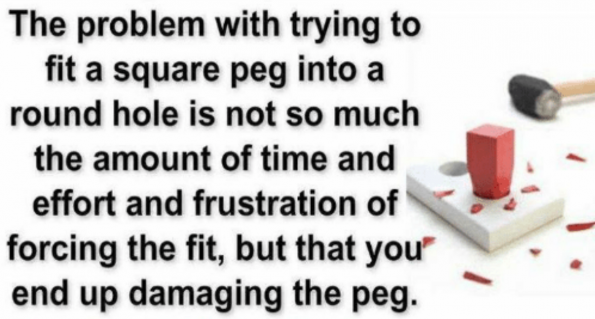
Attention Differences
Different neurodivergent conditions (dyslexia, dyspraxia, dyscalculia, dysgraphia, Tourette’s, ASC, ADHD, etc.) overlap a lot and my ASC traits overlap very strongly with
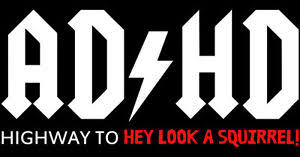
I’m on the Highway to… squirrel
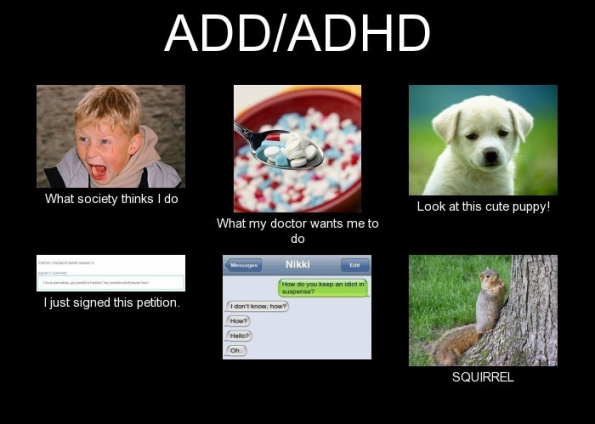
I hadn’t really thought about this until recently, as I’ve never been stereotypically physically “hyperactive”, but the overlap was pointed out by a specialist and I had to stifle a laugh when I read things like this as it played out somewhat like a checklist for me, the only thing I don’t identify with is “Possible addictive tendencies”, but that’s possibly because I’ve got a fairly strong urge to “follow the rules”.
I’m more hyperactive than I realised, but mine is very much mental hyperactivity and I’m constantly restless and agitated. When I talk I’m always going off on tangents and I have terrible bouts of insomnia.

The issues with concentration and focus are among the things that cause me most difficulty at work (remember I said that the things that cause us most difficulty aren’t necessarily the Triad of Impairments). Being easily distracted and flitting from activity to activity are very much things I can relate to (if the animation below isn’t working it may need clicking, it’s much more representative when animated). Attention differences aren’t generally well understood and often come with very strong negative connotations. I’ve tried to use a bit of humour here, but it’s utterly exhausting to live with 24/7.

Sensory Overload
Another thing that can coexist with many neurodivergent conditions is Sensory Processing Disorder, I’m quite sensitive to a few things such as flickery fluorescent lights, movement in my peripheral vision and strong smells, but the biggest issues I’ve got are with audio processing and distorted Proprioception.
I’ll start with proprioception as it’s a sense that not too many people are familiar with, it really relates to one’s own sense of position in space. In the Triad of Impairments infographic under “impairment of social relationships” there’s a little line that says “stands too close to other people” and it’s true that most people have a natural “comfort zone” roughly around arm’s length. The standing too close to people is quite a common autistic trait but is actually due to proprioceptive under-sensitivity, so I’d argue that it’s a sensory issue, not a social relationship impairment, though it can obviously play out that way and end very badly. I suppose that I could say I’m fortunate because I have proprioceptive over-sensitivity, so I don’t end up alienating other people by having “boundary issues”, but it means that my own “comfort zone” can be really large, so if you can imagine how uncomfortable you might find someone standing way too close that’s how I feel more or less constantly and I get really quite intense panic attacks in even modestly busy places, especially when people are close behind me.
Audio Processing is another nightmare which actually plays out in two different ways, the first is Auditory Processing Disorder. In precis in busy places with lots of different sound sources, be they multiple conversations or echoes, it becomes really hard to distinguish voices, hear clearly and identify direction.
It’ s worse than that though, because another autistic trait is poor “gating”. Gating is the ability to separate the relevant from the irrelevant, so it’s often said that autistics are good at details, but in fact it’s more that everything is the detail so it’s like watching 100 different TV channels, non-autistic brains tend to gate things and would focus on one channel filtering out the rest, but autistic brains attempt to process it all and generally end up failing, often spectacularly, due to Sensory Overload.
TMI – I don’t think it means what you think it means!
If you haven’t suffered from Sensory Overload it’s quite difficult to do justice to exactly how bad it feels. It’s really not nice.
The National Autistic Society did a campaign the other year… and the covering picture somewhat illustrates it:
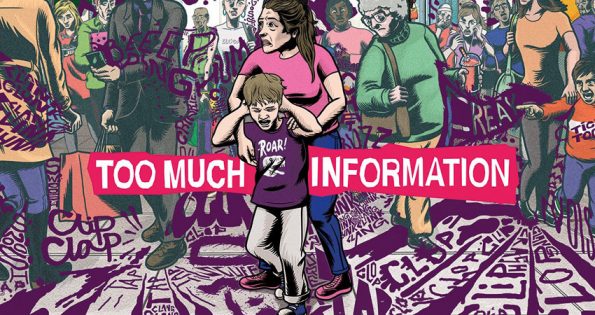
The NAS has also done a few YouTube videos:
Can you make it to the end?
Make it stop
The Film: Too Much Information
Which are OK, but don’t really capture the intensity. The following animated GIF is somewhat of a visual representation, though I actually find it strangely calming as it’s actually a lot less bad than the everyday reality of Sensory Overload in an Open Plan workspace.

Autistic Burnout
So I finally get to the point of this blog. Sorry, it has taken a convoluted path, though it is perhaps strangely appropriate to do a bit of an infodump.
Autistic burnout may be thought of along similar lines to how Spoon Theory works. In precis spoons are an abstract currency representing energy levels – You start the day with a handful of spoons and everything you do cost you some spoons and when you are down to zero you essentially cease to function properly.
I quite like Spoon Theory and it’s worth reading the original paper on the Internet, however, the metaphor that I think plays out better for me is Plate Spinning.
On most days due to the constant sensory overload and distraction I’m in the position of constantly flitting around tending the plates, it’s exhausting, but at least it is an equilibrium of sorts.

Periodically things happen, which cause some extra stress, be it changes to routine, problems in work, that bit of additional noise and then this happens:
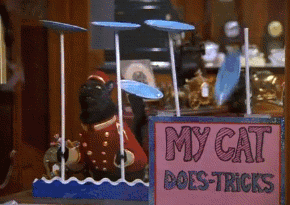
That tends to cause zone-outs, shutdowns or meltdowns, it’s fairly messy though transient, but can wipe you out for hours if not days.
Every now and again though something might happen in your life that really pushes you over the edge and it then plays out more like this:

It’s a funny clip (and all these graphics running together is deliberate)! but I’m very much not joking. Autistic Burnout is basically a long-term impairment of Executive Functions and it really sucks! One might imagine it as:
If you are not familiar with Executive Function it is an umbrella term for the cognitive processes that help us regulate, control and manage our thoughts and actions, and impairments in it can cause difficulties with:
*Planning
*Working memory
*Attention
* Problem-solving
* Verbal reasoning
*Inhibition
*Cognitive flexibility
*Initiation of actions
*Monitoring of actions
People with ASC and ADHD already have impaired executive function and a burnout is sometimes referred to as like a “regression” or “I just feel more autistic” and traits become more pronounced and it’s harder to pass. It has so much impact on day to day life let alone be creative or productive. it’s one of the reasons I said “it’s complicated” when referring to functioning labels earlier.
Burnout can be caused simply by long-term exposure to the things I illustrated earlier in this blog, but in my own case, I think what pushed me over the edge was developing a serious heart condition last year. Sure it sucks! but the interesting perspective is that everybody gives a fair bit of sympathy for the heart problem because I guess people can relate to it and OH was quite taken aback when I said that the heart problem wasn’t really the problem.
From my perspective (and to be fair my heart failure symptoms aren’t too bad at the moment) it’s significantly easier to deal with that than the constant sensory overload and inability to focus, and it was actually the somewhat chaotic series of medical appointments
totally trashing my routine that pushed me over the edge, coupled with the inability to communicate with medical practitioners when you have to deal with multiple ones and they are giving conflicting information and then have to deal with a pharmacy seemingly unable to get my prescriptions correct and coming close to poisoning me (some of my meds are quite toxic).
I’m not naive enough to expect to get my old life back, but at the moment I think I’d settle for running around spinning plates.

